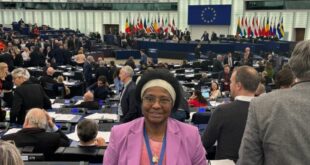The north-western Paris suburb of Argenteuil was in disarray on Sunday in the latest of a string of violent protests over the alleged police rape of a 22-year-old black man identified as Théo.
Video that apparently showed Theo’s arrest has been circulating on the internet for many days, showing the youth worker on the ground against a wall being beaten by four men.
Théo was assaulted by the four policemen on 2 February in Aulnay-sous-Bois, a suburb north of Paris and by the time he arrived at a hospital emergency room, he was covered in blood.
Doctors discovered that his primary injury had been caused by a police baton which was forced inside the man’s rectum.
Théo, whose last name has not been released, maintained that the injury, which required major surgery to repair, was inflicted intentionally and that he was the victim of a horrific sexual assault and racist abuse.
The young man, whose family say was not known to police, also suffered head trauma.
French investigators surprisingly reached an entirely different conclusion: The violent sodomy was accidental and occurred when the officer’s expandable baton happened to slip into the victim’s anus.
The police conclusions, sharply criticised by rights groups, only served to further enrage young French people of immigrant origin who see the police trying to shield its officers.

French President François Hollande visited Théo last Tuesday and spoke of the young man reacting with “dignity and responsibility.”
Hollande’s visit did little to quell the fury of rioters, who in recent nights have “aimed large fireworks at police and set fire to cars and garbage bins” in the “working-class region northeast of the French capital with a large minority population” known as Seine-Saint-Denis, according to the Associated Press.
Between Wednesday night and Thursday morning alone, the AP reported, police arrested 26 people.
On Saturday, protests continued, with hundreds marching in demonstration, according to the AP. Some protesters reportedly lit a vehicle afire, while others threw projectiles at police. Officers responded with tear gas.
Around 50 people gathered in Argenteuil’s main square at around 5:30pm local on Sunday in response to a call posted on social media, according to police.
Demonstrators hurled projectiles at police, setting fire to a vehicle and three rubbish bins.
Théo and his family are urging the community to act peacefully.
“I would like to ask the residents of my neighbourhood to calm down,” he told the French news station BFMTV. “I ask them to stop the hostilities because I love my city and I want to find it the way I left it.”
“Violence is not the way to support me,” he added. “Justice will do its job.”
After days of violent protests, three officers involved in the assault have now been charged with aggravated assault and a fourth is being investigated for rape despite the police scandalous conclusions, announced French Interior Minister Bruno Le Roux Monday.
Yasser Louati, a French human rights and civil liberties activist, told Al Jazeera: “Police brutality is not a random and isolated event, but is more accurately a structural problem that [the government] has so far refused to address … nobody wants to see what is happening at the systemic level.”
The solution, he said, does not lie in “cosmetic changes … it is in addressing [the question] why do these events keep happening? Unless you address the why, these events will keep happening”.
Theo’s suburb of Aulnay-sous-Bois was one of the worst-hit areas during 2005 riots around Paris, which were prompted by the deaths of two teenagers – Zyed Benna, 17, and Bouna Traore, 15 – who were electrocuted after running away from police.
That incident touched off three weeks of violence in which 10,000 cars and 300 buildings were set on fire, spurring Nicolas Sarkozy, then interior minister, to declare a state of emergency.
Adira Kallo
 THE AFRICAN COURIER. Reporting Africa and its Diaspora! The African Courier is an international magazine published in Germany to report on Africa and the Diaspora African experience. The first issue of the bimonthly magazine appeared on the newsstands on 15 February 1998. The African Courier is a communication forum for European-African political, economic and cultural exchanges, and a voice for Africa in Europe.
THE AFRICAN COURIER. Reporting Africa and its Diaspora! The African Courier is an international magazine published in Germany to report on Africa and the Diaspora African experience. The first issue of the bimonthly magazine appeared on the newsstands on 15 February 1998. The African Courier is a communication forum for European-African political, economic and cultural exchanges, and a voice for Africa in Europe.

































